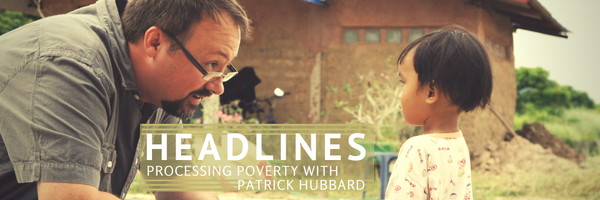In this new monthly feature by Living Bread founder Patrick Hubbard, we hope to inform and address some common concerns about serving the poor by sharing articles and statistics coupled with Patrick’s analysis and experience. It’s our hope that this will help educate you on good practices, as well as help you understand the framework from which we operate. We encourage you to add your responses or questions in the comments, and we’ll do our best to respond to them!
About 22,000 children die each day due to conditions of poverty.
Every life is precious, but the needless death of a child is especially hard to accept. How can you explain the love of God to a mother whose child is suffering from hunger or preventable diseases if you do not address her immediate need for food or medicine? We don’t think it’s possible; at least not in a way that truly represents Christ. The focus of our work among the global poor is comprehensive church planting. This means we equip our church plants to make disciples while meeting basic needs in the process.
In 2010, the average income of the extremely poor in the developing world was 87 cents per capita per day, up from 74 cents in 1981.
If I’ve heard it once I’ve heard it a hundred times: “Yes, but 87 cents is a lot of money in their country.” Actually, 87 cents is not a lot of money in any country! Where we work in southern Brazil, for example, the cost of living is comparable to the city in Virginia where I live. Food and housing cost about the same. Image feeding your family on 87 cents per day, or even 10 times that amount! This is why all of our church plants work to meet basic needs for food and other necessities within their community.
Poverty is the main cause of hunger because the poor lack the resources to grow or purchase the food they need.
Many of the global poor live in rural settings. They often have access to small plots of land, but cannot gather the resources to grow food. Often they also lack the know-how to start and sustain a source of sustenance. While working on development projects to solve these issues are important, the need for food must be met in the interim. Living Bread church plants are addressing both of these issues in Thailand. We are both meeting critical needs and working for long term solutions to the issues affecting the poor.
More than 6.9 million children died under the age of five in 2011 — that’s about 800 every hour — most of whom could have survived threats and thrived with access to simple, affordable interventions.
Often the obstacle to meeting these needs is not a lack of desire to do so. Given the opportunity, most people are moved to help those who are hurting. One of the big issues is: How to help? Or who should help? Our focus on comprehensive church planting among the global poor allows us to address this issue in an interdependent way. We are able to pair knowledge and resources from the developed world with manpower and ingenuity from the developing world to address how best to help within the context of the local church. We believe this is the best approach to combat poverty.
 Patrick Hubbard has an extensive business and ministry background. He worked in the hospitality industry as a General Manager and as a Regional Manager. Along with his wife Bárbara, he is part owner of Freegrance Products LLC, a social enterprise seeking to empower women to escape poverty and avoid human trafficking. Patrick and Bárbara are also the founders of Living Bread Ministries where they have committed almost thirteen years to comprehensive ministry among the global poor. He has also served as a staff member of a local church. Patrick holds a BS in Religious Studies and a MA in Global Studies from Liberty University. He is currently pursuing a MBA from Old Dominion University.
Patrick Hubbard has an extensive business and ministry background. He worked in the hospitality industry as a General Manager and as a Regional Manager. Along with his wife Bárbara, he is part owner of Freegrance Products LLC, a social enterprise seeking to empower women to escape poverty and avoid human trafficking. Patrick and Bárbara are also the founders of Living Bread Ministries where they have committed almost thirteen years to comprehensive ministry among the global poor. He has also served as a staff member of a local church. Patrick holds a BS in Religious Studies and a MA in Global Studies from Liberty University. He is currently pursuing a MBA from Old Dominion University.


